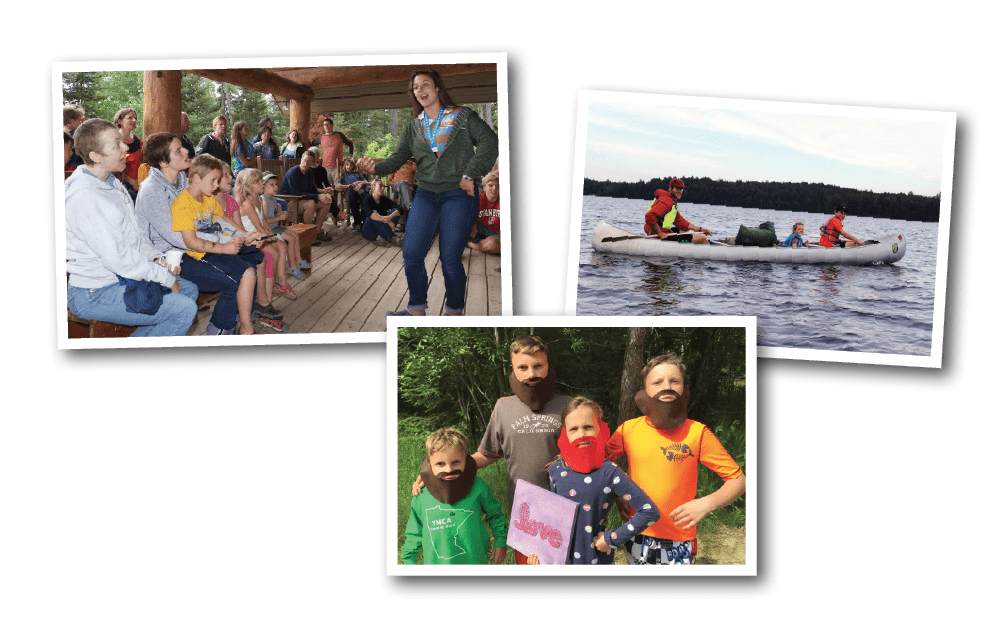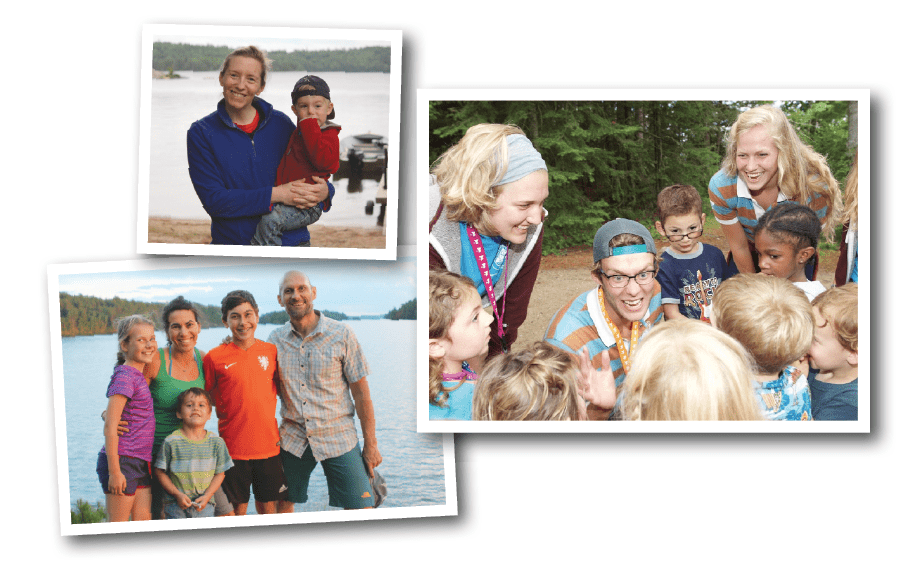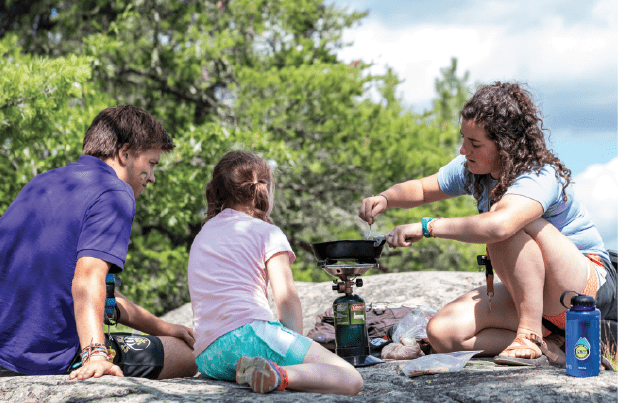All summer long, families stream to the North Arm of Burntside Lake, outside Ely, for a week at camp. There, for the past 54 years, YMCA Camp du Nord has provided opportunities to learn about nature, do arts and crafts, play silly games, acquire skills to explore the wilderness, and have profound shared experiences.

The camp is a lot like a traditional summer youth camp, but kids and parents attend together, and it’s as much about relationships as it is about having fun in the woods.
Family camping is becoming more popular across the country, with the American Camping Association reporting it grew by 11 percent between 2008 and 2012. Du Nord’s summer schedule fills up in January. The camp’s executive director, Niki Geisler, thinks she knows why.
“There is an increased desire for an unplugged experience,” she says. “Adults in particular are recognizing
that you can be present with your family when you don’t have the distractions of screens and technology around you.” She says one unofficial camp motto is “be where your feet are,” and when someone attends its summer program, their feet are firmly planted at du Nord for a week. It runs Saturday to Saturday, June through August, and is much more than a resort.
There are a variety of cabins and tent sites that run from primitive to rustic. In fact, that lodging spectrum is part of a strategy to help people get comfortable with the wilderness.
“We combine the fun and adventure with experiencing wilderness in a way that makes you want to make sure it’s around for generations to come,” Geisler says.
Many families at first choose one of the cozy cabins. They spend a week canoeing, cooking a meal at a campsite, navigating with a map and compass, and sleeping in a comfortable bed. Eventually, many seek a more rustic experience, and choose a tent site for a week. And then they might go on a two or three night overnight trip in the Boundary Waters with a camp staffer. The ultimate goal is that they feel ready to take their family into the wilderness on their own.
A trip to du Nord differs from a Disneyland vacation in a lot of ways, but what parents seem to appreciate the most is the fact they get to relax a little, and somebody else is there to help organize the fun.
Each mornings activities feature all age groups, when kids from toddler to teenager spend time with their peers, while parents are free to do other activities, whether that’s going for a hike or having a cup of coffee and reading a book.
The kids love it. They hang out with others their own age and learn from experienced counselors with a sense of adventure. A progression of wilderness skills is a key component. The toddlers and preschoolers simply interact with nature, while the teens learn about j-strokes and campfire cooking which culminates with an overnight canoe trip.
“Canoeing is a big emphasis here, and hopefully we’re preparing people to enjoy the Boundary Waters for their entire life,” Geisler says.
Families are reunited for the afternoon and evening, when they can participate in more outdoor fun
and creative arts. The week also includes a family triathlon, variety shows, and a popular game called “woody ball,” which Geisler describes as combining capture the flag, pin guard and dress up.
All this fun and learning has a purpose: it strengthens family bonds.
Geisler’s background is working at youth camps, and she says her biggest frustration at those places was that kids would go home, having experienced a life-changing week, and their parents would often be unaware of the impact, unable to understand how their children might be different people than they were before leaving for camp.
Du Nord lets families have these experiences together and change together. An important part of that is doing things out of their usual roles.
“Kids get to see their parents and the adults in their family acting silly, being active and stepping outside their comfort zones,” Geisler says. “I say to the parents, we ask our kids constantly to meet new friends and try new things, but adults rarely do that.”

Doing something different, challenging themselves to do something hard in the woods or on a stage, provides an opportunity to “be present with each other,” Geisler says. That presence is the key to knitting families closer together.
Located down the road from YMCA Camp Widjiwagan, du Nord took a unique tack from its first year of operation in 1961, catering to families instead of solely on youth. There were skeptics, Geisler says, whose attitude was, “we don’t think families will drive 5 hours to use outdoor biffies.”
They were wrong. Du Nord has now grown to 150 acres, three villages, and 43 family lodging options. A new village opened up in 2000. There is a lottery in December to give everyone a fair shot at the cabins. There is talk of how they can accommodate more visitors. “Mini-camps” and other uses in the fall, winter, and spring, including long weekends for women, men, and couples, are growing in popularity.
The future seems to hold promise for du Nord, and it is taking steps to guarantee it will be able to keep doing what it does when the kid campers of today are bringing their own families. They use numerous practices to conserve water, reduce waste, and be sustainable. This also lets them educate visitors about the potential of environmental stewardship.
“We’re modeling what’s possible even on a large scale. We have a garden and many of our building practices have a real green emphasis,” Geisler says. “Our philosophy is more about modeling than overtly teaching.”
While families leave the camp (often reluctantly) after their week feeling inspired and re-energized, Geisler says, they return the favor. “It’s inspiring to know that people want to be connected to nature,” she says. And du Nord is there to make those connections.
www.ymcatwincities.org/camps/camp_du_nord/

This article appeared in the Summer 2015 Wilderness News Magazine

